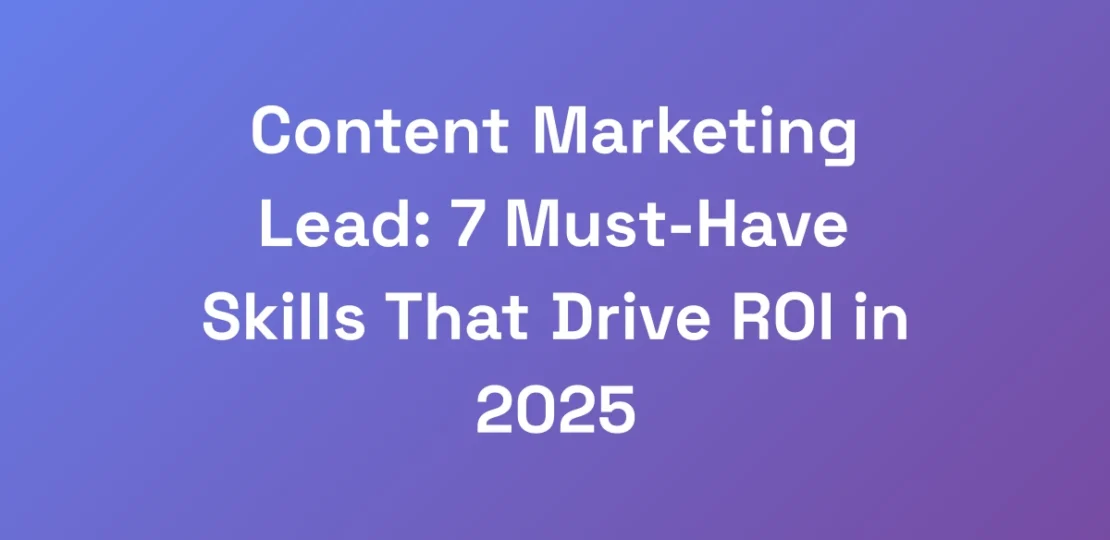Content Marketing Lead: 7 Must-Have Skills That Drive ROI in 2025
March 6, 2025 | by [email protected]

Introduction
Let’s cut to the chase: the world of content marketing stats is evolving faster than ever. What worked yesterday might not cut it today, and if you’re not staying ahead, you’re falling behind.
As we approach 2025, the role of a content marketing lead has transformed from mere content creation to a powerhouse that drives revenue.
Are you ready to elevate your skills to match the demand?
We’re here to break down the seven essential skills every content marketing lead needs to master to ensure they’re not just surviving but thriving in this competitive landscape.
Struggling to see a tangible ROI from your content efforts? You’re not alone. The challenges are real, but so are the solutions.
Stick with us, and you’ll discover the strategic moves that can turn your content strategy into a robust revenue engine.
The Evolution of Content Marketing Leadership: Why Traditional Methods No Longer Work
Let me be direct: most content marketing leads are stuck in 2015. They’re churning out blog posts, scheduling social media, and calling it a day.
But here’s the truth – the game has fundamentally changed.
In today’s market, a content marketing lead isn’t just a content creator; they’re a revenue driver.
The role has evolved from being a cost center to becoming a profit center.
What worked five years ago is now obsolete, and if you’re not adapting, you’re already behind.
According to B2B content marketing benchmarks 2024, staying updated with the latest trends is essential to maintain a competitive edge.
The Shift from Content Creation to Revenue Generation
Gone are the days when posting regularly was enough. Now, every piece of content needs to have a clear, measurable impact on the bottom line.
We’re talking about content that not only engages but converts. It’s about blending creativity with strategic intent.
Think about it: how many times have you poured resources into a campaign that got likes but no sales?
That’s the old paradigm. Today, our focus is on creating content that moves the needle, driving sales and fostering long-term customer relationships.
For instance, General Electric didn’t just create content for the sake of engagement—they positioned themselves as industry thought leaders, which translated into tangible business growth.
Why Most Content Marketing Strategies Fail
Why do so many content marketing strategies fall short of expectations? It often boils down to a lack of strategic alignment and measurable goals.
We see countless teams producing content without a clear understanding of how it contributes to revenue.
It’s like firing arrows in the dark—without a target, you’re unlikely to hit anything meaningful.
Additionally, many strategies fail to evolve with changing market trends and consumer behaviors.
Red Bull’s content-driven approach is a prime example of how adaptability and strategic content creation can build a media powerhouse.
The New Success Metrics That Actually Matter
Traditional metrics like page views and likes are no longer sufficient indicators of success.
We need to pivot towards metrics that directly correlate with revenue, such as conversion rates, lead quality, and customer lifetime value.
For example, 70% of businesses are achieving a positive ROI from their content marketing efforts, highlighting the effectiveness of ROI-focused strategies.
By focusing on these actionable metrics, we can better align our content strategies with business objectives and drive meaningful results.
Core Technical Skills Every Modern Content Marketing Lead Must Master
Stop wasting time on vanity metrics and “nice-to-have” skills. What I’m about to share are the non-negotiable technical competencies that separate six-figure content marketing leads from everyone else.
These aren’t just skills – they’re your weapons in the attention economy.
Every single one of these capabilities has a direct correlation to revenue generation.
Master these, and you’ll be irreplaceable. Ignore them, and you’ll be obsolete within 18 months.
For a comprehensive list, check out the content marketing manager skills required in today’s market.
Data Analytics and Performance Tracking
Understanding data is the backbone of any successful content strategy. We can’t afford to make decisions blindfolded.
Tools like Google Analytics 4 allow us to track website traffic, user behavior, and conversion rates.
With 70% of businesses achieving positive ROI from their content marketing efforts, leveraging data is crucial to replicate that success.
Integrating solutions like [ERP software for small business] can further enhance your data management and performance tracking capabilities.
Actionable Tip:
- Regularly review your analytics to identify what’s working and what’s not.
- Use A/B testing to refine your content strategy based on real data.
Marketing Automation and Tool Stack Mastery
Automation isn’t just a buzzword—it’s a necessity. Streamlining your processes can save you time and resources.
From email marketing with HubSpot to social media scheduling with Buffer, mastering these tools can significantly boost efficiency.
In 2024, over 80% of marketers are using AI in their strategies, underscoring the importance of automation in contemporary content marketing.
Collaborating with [digital advertising companies in India] can provide advanced automation solutions tailored to your business needs.
Actionable Tip:
- Integrate your marketing tools to create a seamless workflow.
- Automate repetitive tasks to focus more on strategy and creative aspects.
SEO and Technical Content Optimization
SEO remains a cornerstone of content marketing. Without it, your brilliant content might never be seen.
Mastering SEO means understanding keyword research, on-page optimization, and link-building strategies.
Tools like SEMrush and Ahrefs provide comprehensive insights into keyword performance and competitive analysis.
For more in-depth content marketing statistics, leverage platforms like SEMrush to inform your SEO strategies.
Additionally, exploring specialized SEO services such as [hotel SEO], [plumbers SEO], and [lawyer SEO companies] can provide industry-specific optimizations that drive better results.
Actionable Tip:
- Conduct thorough keyword research to target terms with high search intent.
- Optimize your content structure for better search engine visibility.
Content Distribution and Amplification
Creating great content is only half the battle. You need a robust distribution strategy to ensure it reaches the right audience.
Social media benchmarks by industry, email newsletters, and influencer partnerships are essential channels for amplification.
Red Bull showcases how effective distribution can turn content into a brand-defining asset.
Actionable Tip:
- Identify the channels where your audience spends the most time and tailor your distribution strategy accordingly.
- Leverage paid advertising to boost the reach of your high-performing content.
Marketing Attribution Modeling
Understanding which content pieces contribute to conversions is critical for optimizing your strategy.
Attribution modeling helps us track the customer journey and attribute conversions to specific touchpoints.
This method ensures that we’re investing resources in the most effective content channels.
Actionable Tip:
- Implement multi-touch attribution models to get a comprehensive view of your content’s impact.
- Use these insights to allocate your budget more effectively.
Strategic Leadership Skills That 10x Your Impact
Here’s what nobody tells you about being a content marketing lead: technical skills only get you halfway there.
The real multiplier comes from your ability to think strategically and lead effectively.
I’ve seen brilliant content creators fail in leadership roles because they missed these crucial elements.
The skills I’m about to share aren’t taught in marketing courses – they’re learned through trial, error, and millions in tested marketing spend.
Cross-functional Team Management
Leading a content team isn’t just about managing writers and editors.
You need to collaborate with sales, product, and customer service to create cohesive content strategies.
Effective communication and coordination across departments ensure that your content aligns with broader business goals.
Actionable Tip:
- Establish regular inter-departmental meetings to sync on content initiatives.
- Use collaboration tools like Slack or Trello to manage cross-functional projects efficiently.
Content Strategy Development and Execution
A solid content strategy is the foundation of successful marketing efforts.
We need to define clear objectives, target audiences, and content themes that resonate with our customers.
Execution is
RELATED POSTS
View all


